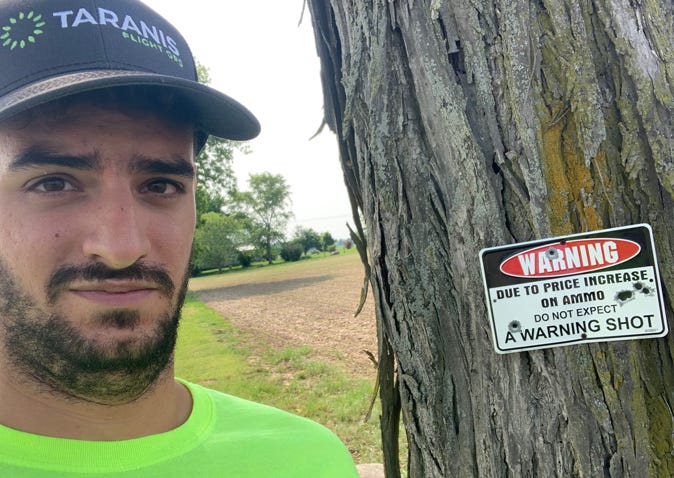How can developers become more business oriented
Attending Zoom meetings with your clients doesn't count
It’s considered common sense that you should care the business side, and understand what problems are you trying to solve.
But HOW can you do it?
Easy right? Just talk to your customers. Create a focus group, and REALLY listen to what they say!
While better than nothing, a couple of Zoom conversations are barely a beginning.
My advice - try to find a way to experience the industry from the inside. Go wild with your imagination.
Not as a software developer who just came to ‘ask a few questions’:
but as an insider:
In the second part of the article, I’ll share why I decided to get a license from the FAA (the US Federal Aviation Authority), and how it helps me in my job as a development team leader.
Ideas for getting to know the business
The purpose of this list is to explain what the type of ‘insider-experience’ I’m talking about. The specific examples matter less - let me know if you have better ones!
InsurTech - you can become an insurance agent in a few weeks of online study! (and an exam). Think about how useful it can be for your own life and for your family.
Autotech - your family probably owns a car. How impressive will it be when you’ll fix it yourself after some basic car mechanic training?
Let’s say you work at Waymo (formerly known as the Google Self-Driving Car Project). This knowledge might not be directly useful in your job, as you won’t need to repair cars. The thing is - you can never know how will you use that knowledge. Maybe you’ll better understand the conversations in the hardware department? Or it’ll give you interesting ideas to try out?Cyber - consider a short CISO-like training. Google provides a good balance of depth/time with its ‘Cybersecurity Professional Certificate’ course. Yes, it’s ~150 hours. Who said it’ll be easy?
Fintech - you can get a professional certificate for stock trading easily. Definitely a useful topic to know.
LegalTech - Try to go for Paralegal certification if you are in it for the longer term. Or you can go for a dedicated and shorter specialty, like intellectual property law essentials.
E-Commerce - There are tons of short and cheap certifications for SEO and digital marketing. The important part is to put that knowledge into use - help your friends for free, or try it on your own website.
Hospitality (Booking.com, Airbnb) - go take a few shifts in a hotel! Yes, I’m absolutely serious - no better way to know what happens behind the scenes.
HealthTech - volunteer near your home / go through a first aid course /train as a certified nursing assistant (CNAs).
And if you work at Big Tech:
Facebook - talk with a friend who has a business that uses Facebook ads, and play with it yourself.
Google - Do you work on YouTube? Try to upload videos, feel the experience of the creators, how the analytics work, how can you put ads.
Amazon (not AWS) - Try to sell something :)
5 reasons for why it helps
“Really? Getting certified as an insurance agent just because I work at an InsurTech company? Isn’t it too much?”
NO.
Back in the 90s, Continental airlines Gordon Bethune got certified as a commercial pilot, just so he could better understand and talk with his pilots (he transformed the airline from the worst to one of the best, he shares the journey in the great book ‘From Worst to First’). While pilots are not the customers, the point is the same - go an extra mile to understand the industry.
Speaking the same language - even if your product is not directly sold to insurance agents, it will help you understand the nuances and jargon of the industry.
Be seen as a source of knowledge - your clients will have more respect for you, and so will your peers. Not because of the knowledge you’ll gain, but because of the fact you care enough to gain it in the first place.
Understand WHO are your clients - what do they need to know to get the job? What kind of systems do they use? What are the demographics?
Understand their pains - this is the most crucial part. When you try do do the job of your clients (at least partially), you’ll understand a little better what do you need to do to help them.
It’s useful for you! - you’ll acquire knowledge, meet new people, and maybe open new doors for yourself. Each of us has a completely unique path in their career. Imagine if you could get valueable information that is non-tech related from each stop along the way (and being able to talk about the industry you came from in job interviews is a huge bonus).
You can never know when it’ll be useful. What ideas it will bring, what understanding it will allow you to achieve. Even if you don’t think any of the 5 points apply to you, never dismiss serendipity.
How I almost crashed a $30K drone
Background
I work at Taranis, as a development team leader. We are an 8-year-old startup ($100M total raised), and our goal is to provide Crop intelligence at scale. We fly drones over agricultural fields, capture high-resolution images, process them through AI, and deliver insights to our customers. The insights cover various problems in the field (such as weeds or diseases) - allowing them to make better-informed decisions.
My job
My team is responsible for all the applications for the data acquisition - our drone fleet operations. In 2023, dozens of drone pilots flew millions of acres, which is a huge operation to manage. The 3 main applications we develop are:
Flights Scheduling - automatically deciding when to fly each field, and displaying the information on a Map. The application allows our operation managers to distribute the flights between pilots, monitor the load with various graphs, and make sure we deliver on time.
Tech stack: Python microservices, React frontend.Fights generation and image upload - the drone pilots use this desktop app in 2 stages:
Generate the flight plan - they draw the obstacles they see in the field, and we automatically generate the most efficient flight plan to cover the whole field
Image upload - once they finish flying, they upload the images to the app. It validates the quality, and if everything is ok it starts to upload to the cloud.
Tech stack: Electron, React.
Flight execution - An android-native app, written in Kotlyn. It is installed on the DJI-provided remote, and controls the drone.
Connecting to the business
I’ve been on this team for 3 years, first as a developer and then as a team leader. In all this time, I’ve never tried our applications in a real-world scenario.
Last May, I decided to change that. I felt that the only way to understand how our system is used, is to try it myself. As our drones are huge, and we fly them commercially, I had to get the small-unmanned-aircraft-systems (fancy name for a drone) FAA license.
So I studied for a few weeks, took a 6-hour online course, and then flew to the US. I took (and passed) the exam, and was ready to fly!
A day in a drone pilot’s life
I used our Flight Scheduling System to assign myself 3 fields of 250 acres total to fly the next day. This is ~30% of what an average drone pilot is doing! I went with one of our Operations manager to an empty field, for a couple of hours of hands-on training.
Next morning, I came into our office to get the equipment
Put stickers on the car
A special yello shirt
A hat to identify myself
blinking lights
an SD card for the camera
A flash card for the mission
A huge box with the M300 drone
2 boxes heavy boxes with batteries
After a 2 hour drive, I arrived for my first field:
I unpacked the drone, assembled the camera and batteries, and put the blinking lights on the car. Opened the laptop with our Flight Generation app, and created a flight plan. Ready to go!
Our fight execution app executes the flight in an automated way, so there is nothing really to do. I watch the drone flying and taking pictures for 10 minutes. Then I understand it will dissappear from my line of sight because of a line of trees in the middle of the field.
I decide not to risk it, and walk along the edge of the field so I won’t lose it (that’s the regulation). It's damn hot.
Everything is fine. I accompany the drone back.
30 photos to go, the batteries are down to 20%.
I needed to land the drone, perform a battery swap, and resume the mission.
What’s my point?
I can go on an on. On the second field, I couldn’t take off, because I was too close to an active airport. So I had to wait an hour until it was solved by one of our guys in the office. Once I flew it, I got very close to the powerlines, and was saved from a crash by the obstacle avoidance system of the drone (which refused to fly into the pole).
On the third field, I saw this cheerful sign, and huge dogs were trying to eat me (luckily behind a fence):
I learned what it truly feels like.
I skipped tons of details from that day, but A LOT of it was new to me. Some even gave me ideas for features I’m planning to implement (like the manual geozone unlocking because of the proximity to the airport).
It strengethed my connection to my team’s clients - the operations team. We shared some jokes about stupid questions on my exam, and they laughed at my ‘unique’ problems during the day.
Is this it?
Getting some certificate and doing a day-in-the-field is great - harder to do than a Zoom call, but much more memorable.
This too, is just the start. It takes an on-going effort.
More ideas to get connected to your business:
Read an industry newsletter (if you are in AgTech, I recommend
and !)Go to industry events and meetups, even if they are not tech related (I tried it once in 2022 with PlaneTech and enjoyed it very much!)
Shadow a customer (with permission of course), see exactly how their day-to-day looks like. I didn’t try that one yet, but someday I definitely will.
Summary
Think of a way you can get practical knowledge and experience in your industry. It doesn’t have to be quick or easy.
Get your boss’s approval.
Execute!
I guarantee you won’t regret it. Remember - to truly learn a business domain, you have to do it from the inside.
I’ll wrap up with a 30 second video of me (barely) landing the $30K drone:









Very interesting topic.
Do you think every developer in a company should take training related to the company's field?
Thank you! :)
You've lit a fire under me with this article! I'm now investigating certs and quals that are relevant to my client base in three countries.